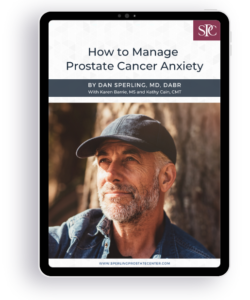Originally published 8/30/2015
It is nearly 10 years since we posted the blog below, which addresses the emotional and psychological burden that can accompany being on Active Surveillance (AS) for prostate cancer (PCa).
There appears to be a parallel situation for women diagnosed with ductal carcinoma in situ (DCIS) who are often placed on image-based monitoring. DCIS is an early form of breast cancer where cancerous cells are found within the milk ducts of the breast, but they haven’t spread into other breast tissues.
DCIS can vary; some strains may never become more dangerous, while others can become life-threatening. Many experts are concerned about the depression and anxiety that can complicate monitoring. One team writes: “Anxiety stemming from biannual imaging and the psychological burden of living with an untreated lesion are critical concerns. Evidence from prostate cancer trials … has shown that active surveillance can lead to comparable levels of anxiety as more invasive treatments over time.”
Just as with prostate cancer, more study is needed to “… provide a fuller understanding of the trade-offs associated with active monitoring.”[i] One trade-off is fear that a time bomb is ticking in one’s body.
Both Focal Laser Ablation and TULSA are treatments that destroy the tumor—therefore de-fusing the “bomb”—while preserving healthy tissue and prostate function. PCa patients who feel uncomfortable with the idea of AS may wish to learn if they qualify for a focal treatment. Contact our Center for more information.
There’s been a noticeable uptick in urologists recommending active surveillance (AS) for patients diagnosed with early stage, low risk prostate cancer (PCa). NOTE: For purposes of this blog entry, I’m assuming the diagnosis was accurate and did not miss any biomarkers for hidden aggressive cell lines.
Indeed, recent studies have shown that more men are, in fact, choosing to go on AS as a way to delay treatment and its accompanying risks of urinary and sexual harm. For the majority of men on AS, they are comfortable with the tradeoff of taking on some worry in exchange for avoiding treatment for the time being. However, according to a new British study, nearly a quarter of men on AS will become depressed and anxious.[ii] It’s an interesting study because it took into account not just how many men had some degree of emotional turmoil, but also the demographics of the population being studied.
The cohort was comprised of 313 men on AS. They ranged in age from 51-86 years (mean age 70). Three-fourths (76%) were married or in civil partnerships, and the majority (94%) were Caucasian. In addition, their employment and educational background were recorded. All of them were given a questionnaire called the Hospital Anxiety and Depression Scale (HADS). Their demographic data was correlated with their HADS score to take into account other variables besides prostate cancer and AS that might account for depression and anxiety. Finally, their scores were compared with available data on comparable non-PCa patients in the general population.
The authors found that the AS patients were twice as likely to be depressed as non-PCa patients, and three times as likely to experience anxiety. (The only general demographic predictor for anxiety or depression was being divorced.) Of special note is the tendency of AS patients toward “substantially greater levels of anxiety than patients with PCa treated radically.” The authors found that their results were consistent with smaller published studies on the same topic. They report some evidence that self-care tools such as information available on the internet may help reduce the inner toll of those affected by negative emotions while on AS, but more research is needed on ways to meet their needs.
Other studies have repeatedly shown that when worry becomes too great, men on AS opt for treatment. This is one area where focal therapy such as Focal Laser Ablation (FLA) offers an advantage over AS. Although long-term success data for FLA has not yet been established, the majority of our own patients including some who are more than five years out from treatment have experienced durable results. They are able to have normal lives, monitor success by imaging and complex PSA blood tests, and be liberated from fear and depression. They know that if necessary, FLA can be repeated—or they can choose any other treatment if cancer comes back.
At the Sperling Prostate Center, we feel rewarded knowing that our treatment alleviates the worry and depression that can erode the peace of mind of many AS patients. If you are on AS and are not entirely comfortable with it, give us a call to find out if you are a candidate for FLA.
Download Our Free Ebook: “How to Manage Prostate Cancer Anxiety”

Don’t let anxiety over prostate cancer run you. Instead, learn how you can take charge and empower yourself to manage stress and boost positive treatment outcomes with our “first aid kit” of practical tips and tools.
NOTE: This content is solely for purposes of information and does not substitute for diagnostic or medical advice. Talk to your doctor if you are experiencing pelvic pain, or have any other health concerns or questions of a personal medical nature.
References
[i] Lin A, Zhang J, Luo P. Active Monitoring for Low-Risk Ductal Carcinoma In Situ. JAMA. Published online May 05, 2025. doi:10.1001/jama.2025.1946
[ii] Watts S, Leydon G, Eyles C et al. A quantitative analysis of the prevalence of clinical depression and anxiety in patients with prostate cancer undergoing active surveillance. BMJ Open. 2015 May 22;5(5):e006674. doi: 10.1136/bmjopen-2014-006674.


